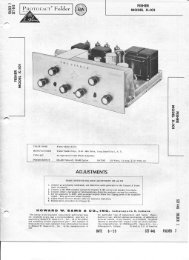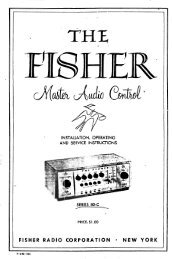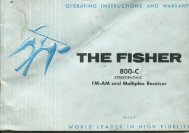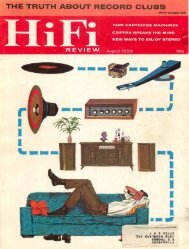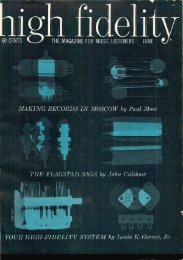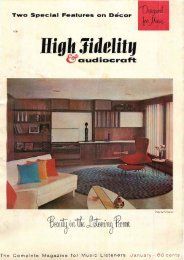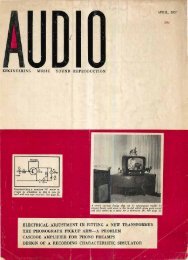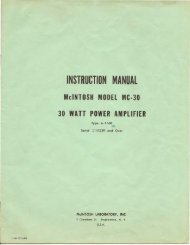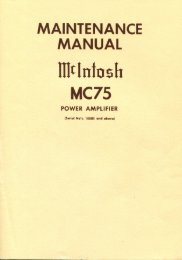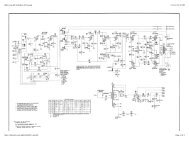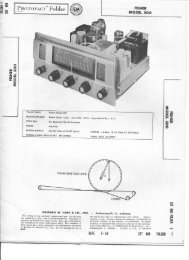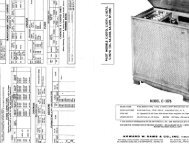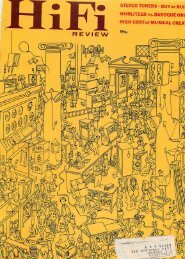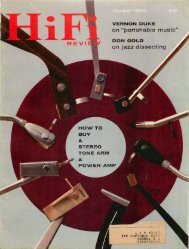~flr'6,r"®
Hifi Stereo Review â July 1958 - Vintage Vacuum Audio
Hifi Stereo Review â July 1958 - Vintage Vacuum Audio
- No tags were found...
Create successful ePaper yourself
Turn your PDF publications into a flip-book with our unique Google optimized e-Paper software.
tentiou by surrounding it with a quality<br />
of recorded sound which can only be described<br />
as brutal. For one thing, there is<br />
elephantiasis of piano sound, with the<br />
orchestra too often relegated to remote<br />
background rumblings. Important leading<br />
voices in the woodwinds are often completely<br />
swamped by the Brobdingnagian<br />
quality of the piano reproduction. Yet the<br />
tympani, in the famous duet with the solo<br />
piano in the last movement's coda, come<br />
through with a surprising clarity and presence.<br />
If all this is due to faulty monaural<br />
transfer of the stereophonic original, then<br />
perhaps final judgment should be suspended<br />
until Capitol releases the performance<br />
on stereo tape and/or disc.<br />
M. B.<br />
• BEETHOVEN: Violin Concerto in D<br />
Maio;, Op. 61.<br />
Igor Oistrakh with the l ondon Pro Arte Orchestra,<br />
Wilhelm Schuechter cond o Ange l<br />
35516.<br />
• BEETHOVEN: Vio lin Sonatas-A Maior,<br />
Op. 47 ("Kreutzer"); G Maior, Op. 30,<br />
No. 3.<br />
Nathan Mil stein with Artur Balsam (piano).<br />
Capit ol PAD 8430.<br />
The soloist featured on Angel's disc<br />
brings to my mind an automobile trip<br />
during which I tuned in a broadcast<br />
after a concerto had begun, and was so<br />
impressed by the quality of the violinist's<br />
playing that I avoided entering a tunnel,<br />
just at the end, so that I would be sure to<br />
catch the soloist's name. It was Igor, son<br />
of David Oistrakh.<br />
In general conception, this latest version<br />
of one of the most beautiful concertos<br />
ever written for the violin, comes as close<br />
to perfection as I could wish. The tempos<br />
seem right, and the first movement,<br />
especially, emerges with a beautiful sense<br />
of poise. Oddly enough, the sole lack lies<br />
in its ultimate technical polish-the very<br />
thing that had originally so impressed me<br />
on my introduction via auto radio to this<br />
artist's playing. But that was in a flamboyant<br />
Russian concerto. The relative<br />
purity of Beethoven is, in the long run,<br />
more demanding. The recorded tone of<br />
the violin itself has here a slightly "boxlike"<br />
quality.<br />
Such negative criticism applies only to<br />
brief moments during the course of tIllS<br />
disc. Generally speaking, it is a satisfying<br />
enough version; but I had been led to<br />
hop ~ for stich perfection.<br />
52<br />
Capitol's release offers two spirited<br />
performances. Aside from the individual<br />
virtuosity, there is magnificent teamwork<br />
between the players. In the florid sections<br />
of the " K1"liutzer" variations, both men<br />
play as if they were one instrument. Good<br />
sound.<br />
D. R.<br />
Premiere and Renewal<br />
• R. STRAUSS: Arabella - Complete<br />
Opera.<br />
lisa della Casa (soprano), George london<br />
(ba ritone), Hi lde Gueden (soprano), Otto<br />
Edelmann (bass-baritone), Anton Dermota<br />
(tenor) & others with the Vienna State Opera<br />
Orchestra a nd Chorus, Georg Solti cond o<br />
london A 44124 12".<br />
\Vhen Ambella was revived at the Metropolitan<br />
Opera House three seasons ago,<br />
the production featured the same tlll"ee<br />
leading singers (Della Casa, London and<br />
Gueden ) who participate in this first complete<br />
recording of the opera.<br />
The last of the collaborations between<br />
Strauss and Hugo von Hofmannsthal, Arabella<br />
has often been compared to Der<br />
RosenkavalieT. This is doing Arabella an<br />
injustice; for it is a mature work of art<br />
which deserves to stand on its own. If<br />
there are musical reminiscences of the<br />
earlier work, put these down as stylistic<br />
similarities.<br />
The period of the action is 1860, the<br />
locale Vienna. The story deals with the<br />
attempts of an impoverished retired army<br />
cavalry officer, Count Waldner ( Otto<br />
Edelmann), to marry off one of his two<br />
daughters, Arabella ( Lisa Della Cas a ),<br />
to a rich young suitor who then might<br />
save the family from bankruptcy. The<br />
Right One turns out to be Iandryka<br />
(George London), nephew of an old<br />
army buddy of Waldner's, but before<br />
matters can be set straight at the opera's<br />
conclusion, the usual stumbling-blocks intervene.<br />
Clllef among them is revealed in<br />
the sub-plot wherein Arabella's younger<br />
sister, Zdenka (Hilde Gueden ), gives herself<br />
to another of Arabella's suitors, Matteo<br />
(Anton Dermota), a bumbling anny<br />
officer, under the cover of dark'lless and<br />
while pretending that she is really Arabella.<br />
Further complicating the situation<br />
is the fact that, until the end, Zdenka is<br />
masqueraded as a boy, this because the<br />
poverty of the family will not allow for<br />
the presentation of two daughters to Vienna<br />
society. But everything works out fine<br />
at the end.<br />
The music itself is a gorgeous outpouring<br />
of effulgent melody, with really outstanding<br />
moments. Most memorable of<br />
all is probably the final scene when Arabella<br />
descends the staircase of the hotel<br />
holding in her hand a glass of water sym~<br />
bolic of her chastity and her eternal allegiance<br />
to Mandryka. Das war sehr gtlt,<br />
Mand1·yka, she sings, and the opera ends<br />
with a duet of surpassing beauty. London's<br />
presentation of the work is of outstanding<br />
excellence. Accompanying the<br />
discs is a booklet with cogent essays by<br />
\ViIliam Mann about the opera, its story,<br />
and music. Musical illustrations of the<br />
chief themes are printed at the end of the<br />
libretto, and tlll"ougbout the text of the<br />
libretto itself the appearance of these<br />
chief motives is spotlighted.<br />
The performance is all one could hope<br />
for. Not only are Della Casa, Gueden and<br />
London just right for their roles, but all<br />
the secondary parts are expertly handled,<br />
too. Solti and the Orchestra are as authoritative<br />
here as they were in the recording<br />
of the Third Act of D-ie Walkii1·e.<br />
This set is highly recommended.<br />
M. B.<br />
• ROSSINI: The Barber of Sevi lle-<br />
Complete Opera.<br />
Maria Callas (soprano), Luigi A lva (tenor),<br />
Ti to G o bbi (ba ritone), Fritz Ollendorf<br />
(bass) & others with the Philharmonia Orchestra<br />
and C horus, A lceo Galliera condo<br />
Ang el 3559 C/l 3 12".<br />
Let it be said at the very outset: This<br />
is tIle finest of tIle available recordings of<br />
Rossini's sparkling opera. Callas is in<br />
wonderful form ; vocally this is one of her<br />
finest performances to date. She sings<br />
'rim B.\HHEH. OF '>EYlLLE 'II"" I<br />
with a freedom and lack of strain she has<br />
not always been able to summon. And<br />
how she colors h er portrayal of Rosina!<br />
Gobbi makes a superb Figaro, without<br />
ever indulging in some of the excesses<br />
which mar Bastianini's performance in the<br />
London recording (A-4327). The Almaviva<br />
of Alva is on a ratIler less exalted<br />
level, but he sings cleanly and with good<br />
taste. Galliera has a real flair for tIle score,<br />
guiding the proceedings with an enlivening<br />
hand.<br />
Completing a very happy picture is recorden<br />
sound of richness and warmth. If<br />
you've been waiting for a really first class<br />
performance of this opera, tillS is itl<br />
M. B.<br />
Two Ways with Schumann<br />
• SCHUMANN: The Four Symphonies<br />
-No. 1 in B-flat, Op. 38 (" Spring" ); No.2<br />
in C Maior, Op. 61; No.3 in E-flat, Op. 97<br />
( "Rhenish"); No. 4 in D Minor, Op. 120.<br />
Phi lharmonic Pro men a d e Orchestra, Sir<br />
Adrian Bo ult condo Westminster XWN 2223<br />
2 12".<br />
• SCHUMANN: Symphony No. 1 in<br />
B-flat, Op. 38 ("Spring" ); SMETANA: The<br />
Mo/dau.<br />
Berlin Radio Symphony Orchestra; Berlin<br />
Philharmonic Orchestra, Ferenc Fricsay condo<br />
Decca Dl 9960.<br />
A couple of issues ago I reviewed<br />
HIFI & MUSIC REVIEW



